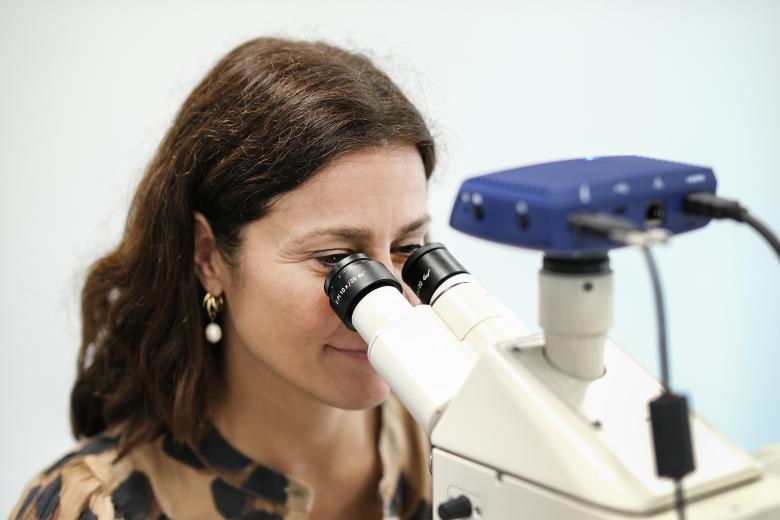Reimagining financial wellbeing
“Do you make lists too?” This was one of the first questions that professor of Financial Services Lisa Brüggen asked PhD candidate Jenna Barrett. Her affirmative reply sealed the deal. An inspiring and fruitful partnership ensued, resulting in Barrett’s dissertation ‘Money matters: Understanding and improving financial wellbeing.’ “My research provides new insights into how you can define, measure and improve financial wellbeing.”
Barrett has a background in psychology and a research master’s in Social and Behavioural Sciences from Tilburg University. When she saw in early 2019 that Maastricht University’s School of Business and Economics was looking for PhD candidates, she decided to apply.
Research mindset
“We received 200 responses, but Jenna’s immediately stood out,” Brüggen says. “Her application was sparkling and personal. What particularly excited me was her research mindset and her mature vision of her research topic. That position ended up going to somebody else, but I knew I wanted to supervise Jenna’s research in the field of financial wellbeing. I did my best to sort out the funding, and then we formulated a research question together.”
With her dissertation, Barrett aims to increase our understanding of and find new ways to improve financial wellbeing. “Policymakers and companies are very interested in this topic. At the same time, there’s a lack of knowledge about how to define and measure financial wellbeing. I opted for a multidisciplinary approach, using different methods and insights from psychology, marketing, finance and economics to understand and improve financial wellbeing.”
Realistic picture
Barrett distinguishes between objective financial indicators and subjective financial wellbeing. “By objective financial indicators, I mean things like income, assets and debts. Subjective financial wellbeing is about how people feel about their financial situation: do they have enough money to pay for their desired standard of living, now and in the future?”
To measure the objective indicators, she used data from the Dutch tax register, enriched with survey data from a nationally representative sample. “According to the literature, there’s only a weak to average correlation between a person’s feelings about their financial situation and their actual income, assets or debts. So somebody with €80,000 might feel worse off than someone with just €500 in the bank; for example, if they’re comparing themselves financially to friends or family. Whereas I found a medium to strong correlation, which suggests that most people have a realistic picture of how they’re doing financially.”
Barret’s findings are good news for companies and organisations looking to improve financial wellbeing. “They should be able to make reliable predictions about their customers’ subjective sense of financial wellbeing if they have accurate information on the objective indicators.”
Pension
Barrett also bridges the gap between the literature on customer engagement and involvement in complex financial products such as pensions. “In practice, it’s very difficult to make people enthusiastic about their pension. Few people think about the future at all. But it’s important to think long and hard now about your financial situation after you retire. During my research, I found that it helps to make pension information concrete and understandable. Don’t just mention the monthly amount someone will receive after retirement, but point out what they’ll be able to do with that amount. What kind of house can you live in? What kind of stuff can you buy? Where can you go on holiday? This appeals to the imagination and encourages people to take action.”
Text continues below the photo.

Netspar
For Barrett, being able to share her interim research results through Netspar was valuable. Brüggen is the director of this independent knowledge network, which advocates a better understanding of the economic and social consequences of pensions, ageing and old age in the Netherlands. “Thanks to Netspar, Jenna received useful feedback from government stakeholders, regulators, pension funds, pension administrators and insurers,” Brüggen says. “She used that feedback to refine her research questions.”
Buying behaviour in the supermarket
Last November, Barrett became a postdoc at Tilburg University’s Department of Marketing, where she studies how people’s finances influence their purchasing behaviour in the supermarket. “It’s a very interesting subject,” she says. “I’m learning all kinds of new research skills and analytical methods. I may have a doctorate, but there’s still a lot to learn and discover.”
Text: Martina Langeveld
Photography: Philip Driessen
Also read
-
Fresh air
Newly appointed professor Judith Sluimer (CARIM) talks about oxygen in heart functioning and the 'fresh air' the academic world needs.

-
Özge Gökdemir and Devrim Dumludağ reveal differences in competitive behaviour between women in the Netherlands
Economists and spouses Dr Özge Gökdemir and Professor Devrim Dumludağ conducted a study for Maastricht University that reveals differences in competitive behaviour between women in the Netherlands. Their findings will be published soon in a scholarly journal. Here, they give us a sneak peek.

-
What exactly is Open Science?
Open Science proposes openness about data, sources and methodology to make research more efficient and sustainable as well as bringing science into the public. UM has a thriving Open Science community. Dennie Hebels and Rianne Fijten talk about progress, the Open Science Festival and what...
